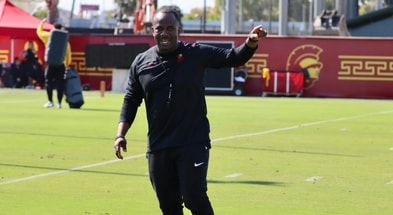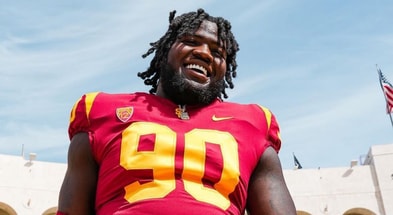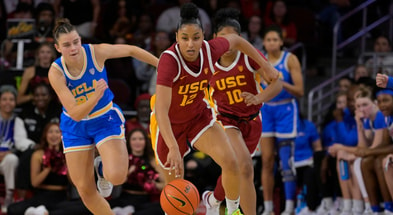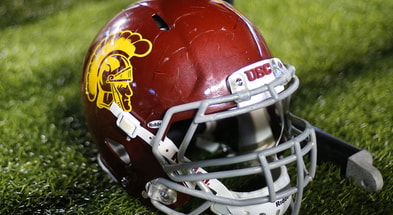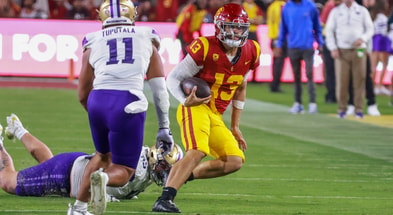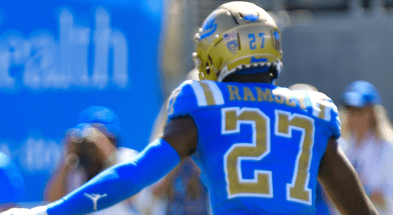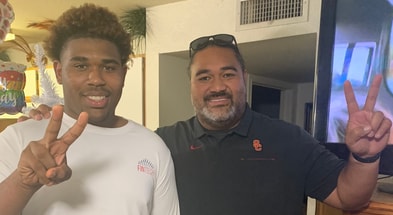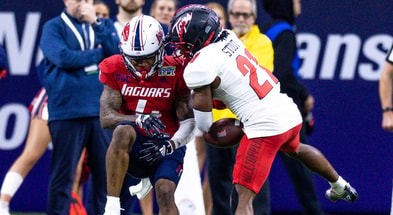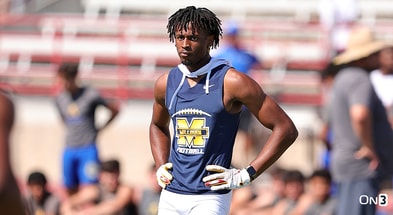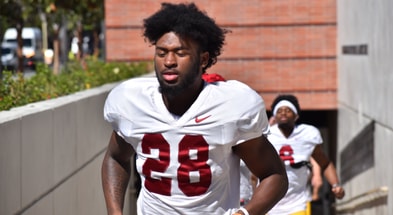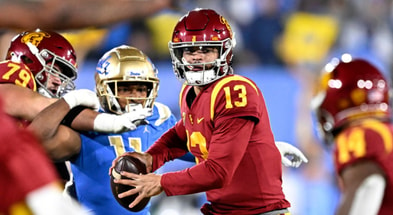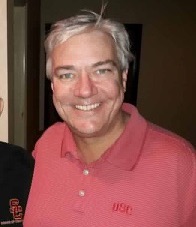Musings from Arledge: The Urban Meyer question, and answer
The Los Angeles Times is out to save our souls. Expressing concern that USC might listen to a win-hungry, short-sighted fan base, the Times ran two different opinion pieces this week, one by Bill Plaschke and another by Dylan Hernandez, arguing that USC cannot hire Urban Meyer without damaging its integrity.
They’re wrong.
USC’s poor hiring practices over the last decade may have damaged the program worse than the NCAA sanctions. USC now has a rare and unusual opportunity to hire one of the best college football coaches who ever lived. USC should seize that opportunity.
The objections Plaschke and Hernandez raise are both shared by a contingent of USC supporters who have made their voices heard, and ones that USC, and its fans, will need to address. The core argument is that hiring Urban Meyer and acting with integrity are incompatible. And I’m willing to concede that there are some coaches who are, and probably should be, untouchable. Art Briles is a fantastic football coach; he also has no business leading another college football program. The question is whether Urban Meyer belongs in the same category.
He doesn’t.
Before analyzing the specific arguments, let’s first set the stakes. What does hiring Meyer accomplish? It will help USC win football games, obviously. Now other coaches might also. But having a coach of Urban Meyer’s status apparently available and interested is a rare opportunity. Make no mistake: this is not a situation where USC can choose any one of many equally qualified candidates. There is one candidate that stands out dramatically above the rest. Urban Meyer is one of the best college football coaches in history. Only Nick Saban among active coaches has had more success, and even Nick Saban would be less of a sure thing to build a dominant program at USC than Meyer, who has built four programs in four stops. (Saban has built two.) There are no guarantees with a coaching hire, but Urban Meyer is as close as you can get to one. Nobody else that USC could hire would even come close to his resume or likelihood of future success.
So it’s all about winning, then? Well, that and the lives and careers of the players in the USC football program. Having a subpar football coach has damaged the career prospects of USC football players in recent years. USC’s players have not developed the skills, toughness, or discipline to achieve their goals, including the goal of making a living in the NFL. They have given up the acclaim (and future business opportunities) that comes even to successful Trojan players who do not succeed in the NFL. The best thing USC could do for its football players is give them a highly competent, professional coaching staff. Let’s be brutally honest: the school has been failing its players in this area for years. Hiring Urban Meyer would fix that problem immediately. It’s good for the student-athletes.
Indeed, hiring a first-rate football coach like Urban Meyer even benefits student-athletes in other sports. USC is saddled with an unpopular conference commissioner, a bad TV deal, and eleven other institutions that lack the nationwide heft to generate the revenues of the other major conferences. That means USC’s athletic department lacks the money that its major competitors in other parts of the country have. That is less money for football, sure, but it is also less for student athletes in sports that don’t generate revenue — less money for equipment, travel, recruiting, and the other things that the non-football sports need to be successful. There is only one way to generate the additional revenues needed, and that is for USC’s football team to resume its place in the national spotlight.
The next football hire will also have a significant impact on the university as a whole. Yes, the football program is a community builder and something that students, faculty, and staff can all rally behind. But more than that, a successful football program helps drive donations and applications. USC can attract better students and more dollars for its facilities and programs with a successful football program.
Winning is important, and we shouldn’t pretend otherwise. But there is a lot more riding on this next hire than simply bragging rights for USC fans in conversations around the water cooler. Urban Meyer would bring enormous, tangible benefits to the university community. Coaches of this caliber are rarely available when a school is looking to fill a coaching vacancy.
So why is it that USC must pass on Urban Meyer, a first-ballot Hall of Fame coach that would almost certainly revive USC’s football program and provide all of the significant benefits discussed above?
It is not because Meyer has been guilty of cheating or shading the rules in the past. There are coaches who have a history of breaking the rules. UCLA just hired such a coach, one who was guilty of NCAA violations and had a show-cause penalty levied against him as a result. Meyer has no history of serious NCAA violations at any of his four stops.
So what is the problem? The Times writers make two arguments. First, Plaschke argues that Meyer “has a history of fostering criminal players” and that he “protected players at Florida throughout multiple arrests for alleged crimes.” Hernandez echoes Plaschke and argues that Meyer “coached a number of players at Florida who were arrested.”
Now every major-college football coach has to deal with players getting in trouble with the law, including USC’s current high-character football coach. For the charge against Meyer to have any validity, it must be that Meyer’s situation is different and, I think, that Meyer himself has been irresponsible in his recruiting or handling of players.
That seems to be Plaschke’s position. Plaschke accuses Meyer of “fostering criminal players.” Fostering means encouraging; is Plaschke saying that Urban Meyer encouraged his players to commit crimes? That’s a pretty significant charge if true. But there is no support for it … and it’s clearly not true. Plaschke’s second charge, that Meyer “protected players” is facially more plausible. But it’s also hopelessly ambiguous. Protected them from what? Law enforcement? University discipline? If there is evidence of such activity, I haven’t seen it.
So what is the reality of the charge? The truth is that Urban Meyer had a large number of arrests at Florida, and that is and should be an issue of concern. He also suspended many of those players and kicked others off the team. Did he fail in this disciplinary aspect of his job? That’s possible, but critics don’t identify any specifics to support their insinuation that he did. And this failure to offer specific errors by Meyer is especially troubling in light of the absence of these issues at his previous stops – Bowling Green and Utah – or at his subsequent stop, Ohio State. So not only is it unclear what, exactly, Urban Meyer should have done differently at Florida, it also appears that his track record at three other programs shows that Meyer did handle his business appropriately at other stops, including his last one. If critics fear that hiring Meyer means USC would be subjecting itself or the surrounding community to a roving gang of Urban-protected criminals, that fear seems exceedingly unlikely. No, feigned.
The second concern commonly raised is Meyer’s handling of the Zach Smith situation. This is a legitimate area of inquiry, and USC’s administration should take it seriously. But it is not clear that the critics’ conclusion — that Meyer is unemployable — is consistent with the facts or fairness.
Plaschke says Meyer was responsible for “trivializing domestic violence” and was eventually suspended for “enabling Smith.” Hernandez says Meyer “protected an assistant at Ohio State who has accused of domestic violence by his wife.”
They offer no evidence to support those characterizations. But I do believe Meyer can potentially be faulted for two things. First, he continued to employ Zach Smith after hearing about the domestic-abuse allegations. But I’m not sure this can fairly be characterized as “trivializing” domestic violence, nor do I think this is an offense – if it’s an offense – that should require Meyer to lose his career. What, exactly, are we saying Meyer should have done? Are Meyer’s critics saying that anytime an employee of a company is accused of domestic violence, even if no criminal charges result and even if his spouse stays with him, that the employee must immediately be fired, and that the failure to fire him “trivializes” domestic violence? I don’t think that position is defensible. I’m not sure I would automatically fire an employee under those circumstances, and I suspect many employers would share my caution.
When you add in an additional factor — Meyer’s long-time relationship with Smith, the grandson of Meyer’s mentor — the calculus gets more difficult. Was immediately firing Smith the right solution? Would Smith’s unemployment have helped Smith’s wife, who remained with him at the time? I don’t know the answer to these questions. To me, they are hard questions.
What we can say with certainty is that, contra the critics, Meyer didn’t put winning ahead of domestic violence concerns when it came to Smith. Urban Meyer’s career didn’t rest on having Zach Smith as a wide receiver’s coach, and it’s foolish to argue otherwise. Does anybody think Urban Meyer would have struggled to hire a new wide receiver’s coach, or that his program would have collapsed if a young position coach like Smith left?
Should Meyer have fired Smith when the first domestic-abuse allegations came to light? I don’t know. But I feel comfortable saying that failing to fire an employee under those circumstances is not an offense that should make you ineligible ever to work again in your own profession. Yet that is what critics seem to be arguing.
There is, of course, a second problem with Meyer’s conduct related to the Zach Smith situation, a very real one in my estimation: Meyer lied about what he knew when the Zach Smith incident came to light and tried to cover up his knowledge. This, and not his “enabling” of Smith, is what led to Meyer’s suspension. It was a serious error in judgment, and Ohio State was right to discipline him. At the same time, should this public lie mean that Urban Meyer is no longer permitted to pursue his occupation? Why? Because the lie was so damaging that Meyer must suffer the ultimate career punishment? Damaging to whom? And why is he still able to work at Fox and Ohio State – without those institutions suffering any obvious harm as a result – but, somehow, USC’s hiring him would result in incalculable harm?
And there’s another thing. I don’t excuse Meyer’s public lie. But I can understand why Meyer wouldn’t want to come clean and throw himself on the mercy of a media that is looking to make headlines and attract viewers, and has the freedom to chase both without considering that Meyer had to make hard personnel decisions about a close family friend and can, instead, simply engage in free moral preening and virtue signaling. If Meyer was concerned that he would not get a fair hearing in the national media, I suspect his concern was well-founded.
Meyer was wrong to lie. Ohio State was right to punish him. Meyer’s handling of Smith was questionable, and I have no issue with those who are critical of it. But what are we to make of it? To make the issue plain, are critics saying that Urban Meyer should never again be allowed to coach football because of his handling of the Smith situation?
That seems like a punishment far in excess of the crime. And ultimately what we’re talking about is punishment for Meyer. We are not talking about protecting USC or the USC community from some harm that Meyer will likely perpetrate upon them. None of the critics seem to be able to identify a specific future harm that is likely to result from the hiring of Urban Meyer. Do we think Urban will employ other assistants who are hurting their wives? That he will bring dozens of dangerous criminals onto the USC campus?
In contrast to the very real and tangible benefits that hiring Urban Meyer would bring to the university, Plaschke and Hernandez show no likely harm that would come from him, other than grumbling from some quarters.
Let me make a final point. USC is suffering through the aftermath of a number of scandals — and a ton of self-inflicted harm — and lots of people want to look at the Meyer hiring through that prism. Hernandez certainly does. Hernandez’s conclusion was that “USC doesn’t need Meyer. The thinking that the football team’s success would wipe clean the university’s shortcomings is why USC got into trouble in the first place.”
Not true. USC didn’t have a doctor abusing young women or a medical school dean hosting meth parties or athletic department officials taking bribes because they were too focused on football success. Those issues – the ones that led to USC getting into trouble – had nothing to do with football, and USC should not choose to hamstring its choice of a new football leader because of issues that had nothing to do with USC football.
The issue here is simple. Urban Meyer is one of the two greatest football coaches of his generation. He is still young and apparently interested in the USC job. USC needs a football coach. You can’t find a better football coach than Urban Meyer. It’s an ideal match. An obvious match.
Yet critics are demanding punishment. They want Meyer to be punished by denying him the ability to practice his profession any longer. They want USC to self-punish, by passing on the substantial benefits that hiring Meyer would provide to the university, its student-athletes, and the wider USC community. And they want this not because of any genuine concern that hiring Meyer will result in some future harm to the university or others, but just out of some generalized notion that Meyer is a bad guy. That just isn’t good enough.
USC should hire Urban Meyer. For once in a very long time, let’s hope USC’s administration does the smart thing.
